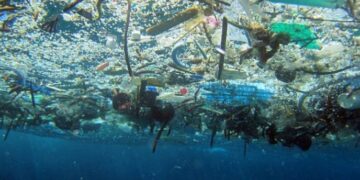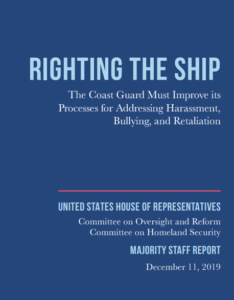U.S. Rep. Carolyn Maloney, the Chairwoman of the Committee on Oversight and Reform, and Rep. Bennie G. Thompson, the Chairman of the Committee on Homeland Security, released the results of the investigation they conducted concerning how the USCG handled bullying incidents and allegations over harassment. Thus, they provide seven recommendations, as the investigation revealed that there is still room for improvement.
The investigation focused on examining the Coast Guard’s processes for receiving, investigating, and resolving allegations, while also determined whether any disciplinary actions should be taken.
The report revealed that the USCG has to enhance the way they deal with bullying and harassment, highlighting that in July 2019, 45% of female cadets reported that they had experienced sexual harassment in 2018—an 11% increase over what was reported in 2016.
The deficiencies found in USCG’s processes when addressing allegations of harassment and bullying were:
#1 Leadership failures and lack of accountability:
The USCG failed to:
- Conduct prompt, thorough, and impartial investigations of allegations of harassment and bullying;
- Hold officials accountable for deficient and incomplete investigations;
- Take corrective action to address retaliation against individuals who report harassment and bullying.
#2 Inadequate policies and procedures:
The investigation found that policies and procedures used now should be enhanced to ensure rapid, thorough and impartial investigation and resolution of allegations of harassment and bullying.
It is of a great importance, additionally, to make sure that USCG’s AHHI policy is fully and consistently enforced.
USCG’s AHHI Policy defines and bans harassment, explains how USCG personnel can report allegations of harassment and requires Coast Guard’s military leadership to investigate the allegations it receives.
In light of the findings of the investigation, the report presents seven recommendations on how the Coast Guard could improve the way it handles bullying and harassment issues.
In essence:
- Leadership should seek to ensure that convening orders identify the specific allegations to be investigated, including the names of the complainants, the alleged victims, and the alleged perpetrators.
- Leadership should ensure that qualified investigators are free of even the appearance of a conflict of interest and are independent of the unit in which the allegations occurred
- Leadership should ensure that individuals assigned to investigate allegations of harassment and bullying are appropriately trained in conducting such investigations.
- Leadership should establish guidelines regarding the process for adjudicating complaints on the basis of investigatory findings.
- Leadership should ensure that investigative reports meet the standards set forth in the Coast Guard’s Administrative Investigations Manual.
- Leadership should prohibit actions that could have a chilling effect on complaints or interfere with investigations.
- Leadership should ensure that antiharassment and anti-bullying policies and procedures are followed.
Concluding, to learn more on the investigation, click herebelow
































































